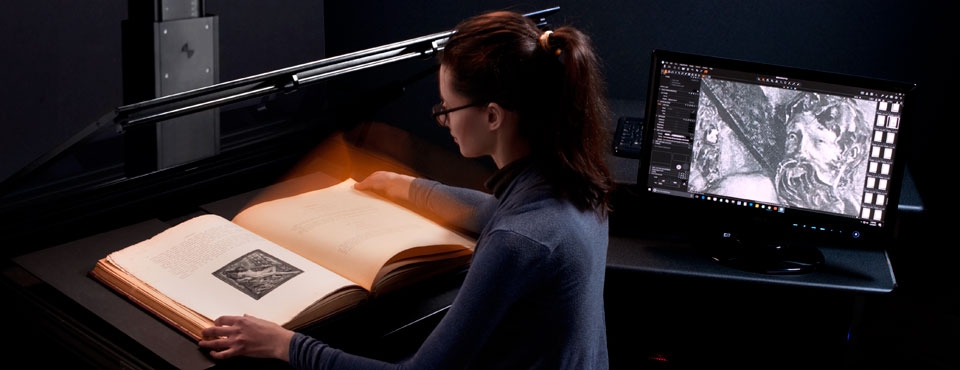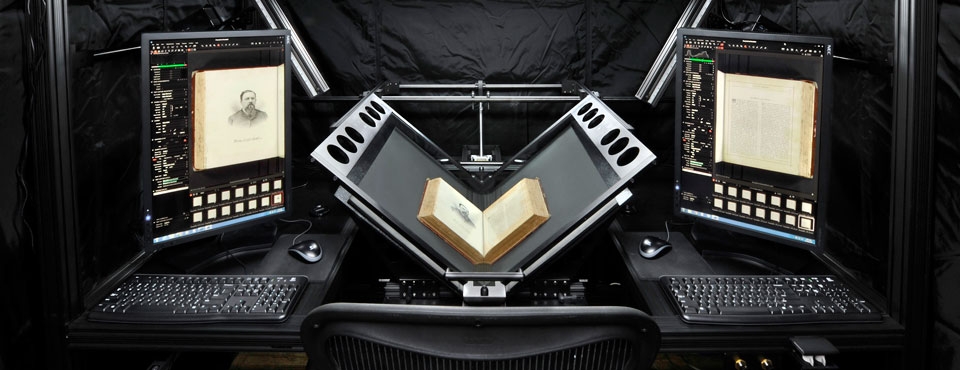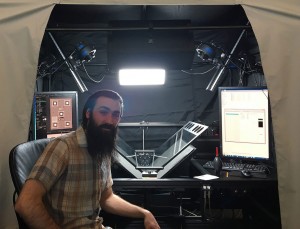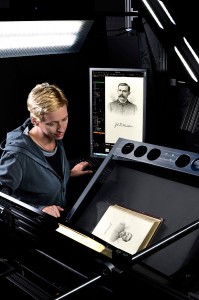FADGI-Compliant Book Scanning Services for the Cultural Heritage Community
V-Cradle or 180 Degree Capture? Yes.
Over the years, Creekside Digital has had a chance to evaluate many scanners and cradles designed for book scanning. While we have standardized on instant-capture cameras (high pixel-count DSLRs and medium format digital backs) for their speed and high quality digitization, we have concluded that there is no single best book cradle. Each simply has its own strengths and weaknesses — so we have accumulated a fleet of many different kinds to allow us to properly handle any conceivable volume we might encounter. All of them are equally at home at your institution or in our Maryland shop (for books that can come to us). Regardless of how varied or different your titles are, we have the equipment and experience so that we can always use the right tool for the job. Like all of our direct capture digitization services, regardless of the platform used, all book scanning projects are executed at a minimum FADGI 3-Star level of performance across all metrics.
Conservation-Friendly V-Cradle Digitization
Creekside Digital can digitize books using the most advanced purpose-built book scanning system available today – the Digital Transitions BC100 Book Capture System. The BC100 features a pneumatically-actuated oversized platen to gently and non-destructively digitize books up to 17” x 25” with bindings up to 6” thick without disbinding or otherwise cutting them apart. Its V-cradle design minimizes or completely eliminates curvature imparted on the page images during book scanning due to tight bindings while respecting the integrity of the materials. The Rare Book Module allow fine-grained joystick control of distance between the platens and the fixed 100 degree cradle to protect fragile spines and pages. And a human operator is in control of 100% of the captures created using this system, which means that unlike robotically-controlled book scanners, our system is safe for fragile, oversized, and otherwise difficult to digitize works. This system has seen use at institutions housing some of the world’s most rare and fragile bound works.
180 Degree Cradles for a Complete Capture
If the camera can’t see it, it won’t show up in your scans. Tightly bound books and books with tiny interior margins often have content that runs right into the gutter. A V-cradle scanner (though gentle) sometimes won’t open the volume wide enough to capture all of the text on every page, and the edge of words can get lost. Enter the 180 degree cradle. As long as your books aren’t extremely fragile and are in decent condition, digitization using a 180 degree cradle will reveal the maximum amount of content on each page without disbinding. These are our preferred type of cradle for scanning yearbooks. Moreover, the large capture area on these platforms makes them great for capturing volumes like scrapbooks and ledgers. Among its 180 degree cradles, Creekside Digital uses the Digital Transitions RGC180. Originally designed for the National Archives, this pneumatically-actuated book scanning system excels at general-purpose digitization and, with its large 30″ x 40″ hinged platen, especially scrapbook capture.
For many years, Creekside Digital has also deployed oversized electronically-driven 180 degree book scanning cradles from i2S including the QUARTZ A1 and QUARTZ A0 as well as the CopiBook for general purpose book scanning and capture of large bound volumes and foldouts. The i2S QUARTZ cradles offer front- and side-loading options for volumes with a limited aperture (indeed, these cradles can hold bindings open to only 90 degrees during capture). Additionally, they support truly huge volumes. On a recent National Digital Newspaper Program award project, our QUARTZ A0 cradle easily swallowed a scrapbook of full broadsheet-sized bound newspapers shot 2-up at 300ppi!
Keep Your Edge. Knock Out Moiré.
By default and according to the FADGI Federal digitization guidelines, Creekside Digital doesn’t crop inside of the page edges of each page’s scan during book scanning. Rather, we retain the edge of each page so your patrons can be sure that they’re looking at a complete digital version of the source book. Of course, we can crop inside of the page edges upon request after digitization (as a derivative — the master file will always retain the page edges) to yield “cleaned up” images ready to load into your favorite page-turning software.
One of the main weaknesses of using modern DSLR cameras and medium format digital backs is that because of the Bayer filter sensors they use, they are susceptible to introducing moiré to your images. Moiré is an interference artifact which sometimes appears in images created with Bayer filter sensors, especially on areas of the image made up of dot patterns like screen printing. It creates a distracting “rainbow” effect in the digital image which is not faithful to the original item. Creekside Digital has developed multiple methods of reducing or even eliminating moiré entirely from the digital images we create.
Incredible Pricing thru the LYRASIS Digitization Collaborative.
For over eight years, Creekside Digital has offered our true preservation-class digitization services to libraries and other cultural heritage institutions across the United States via the LYRASIS Digitization Collaborative. Our premium book scanning services set the standard of high quality for the LYRASIS service footprint. For one low per-page price, LYRASIS members receive:
- 400dpi archival master TIFF (24-bit full color, uncompressed) at a minimum FADGI 3-Star level of performance across all metrics
- JPEG2000 lossy derivative
- Searchable PDF with hidden text
- Text file of OCR output
For more information regarding Creekside Digital’s preservation-class book scanning services available through the LYRASIS Digitization Collaborative, including pricing and eligibility details, please contact Hannah Rosen, LYRASIS Licensing Specialist and Digitization Program Coordinator, at (800) 999-8558 x2918, or email her at hannah.rosen@lyrasis.org.




